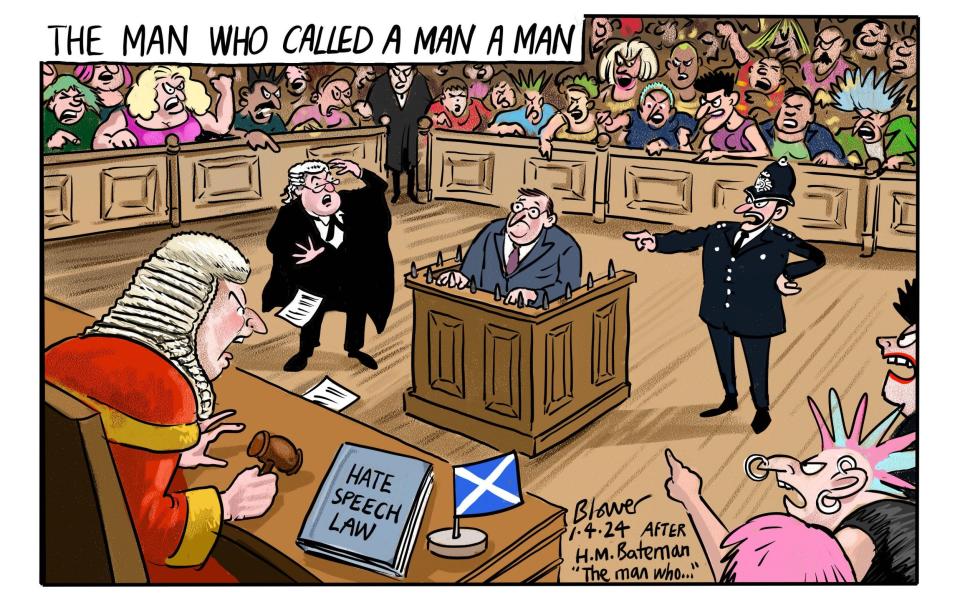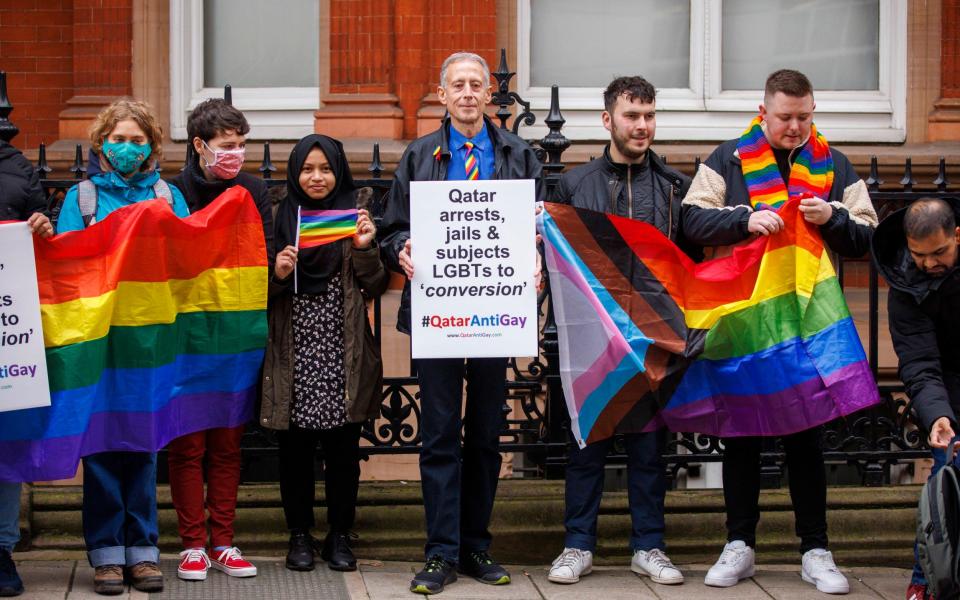JK Rowling has challenged police in Scotland to arrest her under the SNP’s new hate crime laws after a series of high-profile trans women identified as men.
The Harry Potter author, who lives in Edinburgh, tweeted: “Freedom of expression and belief is over in Scotland if correct identification of biological sex is made a crime.
“I am currently out of the country, but if what I write here is considered a crime under the terms of the new law, I look forward to being arrested when I return to the birthplace of the Scottish Enlightenment.”
Rowling posted photos of 10 prominent transgender people on Twitter and mocked their claims that they were women.
Among them was Isla Bryson, who was first sent to a women’s prison after being convicted of two counts of rape.
Adorable Scottish girl and convicted double rapist Isla Bryson found her true feminine identity shortly before her sentencing. Misgendering is hate, so please respect Isla’s pronouns. I love tights! 2/11 pic.twitter.com/aKgOWRdb4K
— JK Rowling (@jk_rowling) April 1, 2024
Among the people she listed was 53-year-old Andrew Miller, who also uses the name Amy George. A transgender butcher kidnapped a young girl on the Scottish border disguised as a woman and harassed her for 27 hours.
Scottish woman and butcher Amy George kidnapped an 11-year-old girl while wearing women’s clothing. I have no idea why this was mentioned in court; Of course she was wearing women’s clothes, she is a woman! Amy took the girl home and sexually assaulted her for 27 hours. 5/11 pic.twitter.com/xy3DmnqZrc
— JK Rowling (@jk_rowling) April 1, 2024
The author also mentioned transgender pedophile Katie Dolatowski, who sexually assaulted a 10-year-old girl in a Morrisons toilet in Kirkcaldy, Fife, in March 2018.
Fragile flower Katie Dolatowski (1.75 cm) was rightfully sent to a women’s prison in Scotland after the conviction. This kept her safe from violent, predatory men (unlike Katie, the 10-year-old girl who was sexually assaulted in the women’s restroom). ) 3/11 pic.twitter.com/13J5XfRo3a
— JK Rowling (@jk_rowling) April 1, 2024
Other trans women she mentioned were Mridul Wadhwa, chief executive of the Edinburgh Rape Crisis Centre:
‘Sexual violence happens to bigoted people too,’ says Mridul Wadhwa, head of a rape crisis center in Scotland. She doesn’t have a gender recognition certificate, but she was still assigned to a job advertised only for women. Rape victims, it’s time to ‘face your prejudices’! 7/11 pic.twitter.com/YfxUhbh6cw
— JK Rowling (@jk_rowling) April 1, 2024
And trans model and activist Munroe Bergdorf:
Munroe Bergdorf is not just a pretty face! She was a public campaigner for a children’s charity until safeguarding concerns were raised and she was appointed as UN Women’s first UK champion. ‘There is no definitive answer to what makes a woman a ‘woman’,’ says Munroe. Great choice, UN Women! 8/11 pic.twitter.com/za6GG5q2Oo
— JK Rowling (@jk_rowling) April 1, 2024
His last post was on TV star India Willoughby. Activists unsuccessfully tried to have Rowling arrested for “misgendering” under existing law after she publicly referred to Willoughby as male.
Finally, India Willoughby proves that we women can call a black streamer a “nasty bitch” who “gets nowhere without being aroused,” call out lesbian men, insult a female Olympic swimmer’s appearance, and “joke” about being kidnapped. feminists and they will STILL get air time! What a girl! 10/11 pic.twitter.com/gShqbEvO5s
— JK Rowling (@jk_rowling) April 1, 2024
At the end of the list, he tweeted:
🎉🌼🌸April Fool’s Day! 🌸🌼🎉
Just kidding. Clearly, the people mentioned in the above tweets are not women, they are all men.
In passing the Scottish Hate Crime Bill, Scottish legislators appear to have placed greater value on the feelings of men carrying out their duties…
— JK Rowling (@jk_rowling) April 1, 2024
He invited people who agreed with him to share the post and used the hashtag #arrestme.
By passing the Hate Crime and Public Order (Scotland) Act, Rowling said MSPs “value the feelings of men who fulfill their own ideas of femininity, however misogynistic or opportunistic, over the rights and freedoms of actual women and girls”.
He said: “The new law is wide open to abuse by activists who want to silence those of us who speak out about the dangers of eliminating single-sex spaces for women and girls, the absurdity of crime data when it comes to violence and sexual assaults being recorded as women’s crimes, allowing men to compete in women’s sports.” the peculiar injustice of gender, the injustice of women’s jobs, the dignity and opportunities received by trans-identified men, and the reality and immutability of biological sex.”
Responding to the posts, Willoughby tweeted: “What a sad, pathetic sight. The world’s most well-known writer stayed up all night writing a mega long troll post about me because of his hatred towards trans people. Totally unbalanced.”
Rowling’s comments come after the SNP’s community safety minister, Siobhian Brown, initially stated that misgendering – such as calling a trans woman “he” – would not be against the legislation “at all”.
But after calls for Rowling to be prosecuted under the Hate Crime and Public Order (Scotland) Act were challenged, he admitted it would be up to the police to decide.
Speaking about the law coming into force on Monday, Ms Brown said: “It can be reported and investigated. It’s up to Police Scotland to decide whether the police think it’s an offence.”
The minister was also criticized for the “bizarre” exclusion of women from the list of protected groups in the law.
This means threats against Rowling and other feminists who criticize trans ideology cannot be investigated under the bill. Ms Brown acknowledged “more work needs to be done” and said a misogyny bill would be introduced.
Humza Yousaf oversaw the passage of hate crime legislation at Holyrood in 2021 when he served as justice secretary in Nicola Sturgeon’s government, but it has only now come into force after Police Scotland said it needed time to train.


The law defines “incitement of hatred” as a criminal offense, expanding on a similar offense based on racial harassment that has been on the statute book for decades.
The new legislation covers hate based on age, disability, race, religion, sexual orientation and transgender identity.
However, an amendment to add gender to the list of protected characteristics was voted down at this stage, despite cross-party MSPs raising concerns about why women were excluded.
A person found guilty of inciting hatred can be fined and imprisoned for up to seven years.
BBC journalist Justin Webb, who interviewed Ms Brown, was revealed to have broken impartiality rules by calling trans women “men” on air in February.
The BBC approved the complaint made against the Today presenter after he said “trans women, that is, men” in the program broadcast on BBC Radio 4 last August.
One listener complained that the comment amounted to Mr Webb expressing his personal opinion on a controversial issue in breach of the BBC’s impartiality requirements.
Concerns that the new law’s definition of hate crime is too vague have led to a potentially “chilling” impact on freedom of expression and lead to a frustrating flood of complaints to the police.
Rowling’s allies, in particular, have suggested that trans activists are keeping her “in their sights.” The author has consistently argued that trans women are not women, and last week vowed to continue “calling men men” after this “ridiculous law” comes into effect.
The Telegraph also revealed that attendees of an official Police Scotland hate crime event in February were presented with a scenario involving a character called Jo, who thought sex was binary and strangely wanted transgender people to be sent to the gas chambers.
Feminist groups claimed the character was a thinly veiled parody of Rowling, whose name is Joanne and is called Jo by her friends.
living in fear
Pressed on BBC Radio 4’s Today program about whether misgendering should be a crime, Ms Brown said no, adding: “We respect everyone’s freedom of expression and no one in our society should live in fear or be made to feel like they don’t belong.”
But Rowling, who was challenged after an SNP councilor claimed Rowling “didn’t have the right to make people uncomfortable and misgender someone”, later admitted “it would be up to the police to assess what happens”.
Ms Brown said it would be an “operational decision” and “it is not for me as a minister to dictate what the police do”.
He said police officers had received “a lot of training over the past year,” including a two-hour online course, and he believed that gave them the criteria on which to base their decisions.
“There is a very high threshold in the law that Police Scotland has jurisdiction over and anything said online or in person will be threatening and abusive,” he said.
“For example, if you are conveying a personal opinion that is challenging or offensive, that will – I would say – not happen. [illegal].”
LGBT campaigner Peter Tatchell told Today it was “a good thing to try to break down prejudice and hatred” but expressed concern that “much of the Act involves subjective interpretation” and is “not clearly defined”.


“There is no definition of hatred when it comes to aggravated crimes. There is no definition of malice or malice. “The caveat now is that it all depends on what a reasonable person would believe,” he said.
“But of course reasonable people believe different things. Therefore, there is concern that the actual interpretation or application of the Law may be clouded by subjective judgments.”
Mr Tatchell added that the “major flaw” in Scottish hate crime legislation was that it “does not protect women against hate” and “there is no protection against misogyny”.
Former SNP deputy leader Jim Sillars has launched a campaign to “resist the Hate Crime Act and campaign for its repeal”.
He said: “Humza Yousaf’s Hate Crime Bill leaves a deep scar on the face of Scottish society.
“Today, Police Scotland will, by its own admission, transform itself from a service to a purpose-driven force – a force that goes after people who speak their mind. How did Scotland, the center of the Enlightenment, come to this point?”